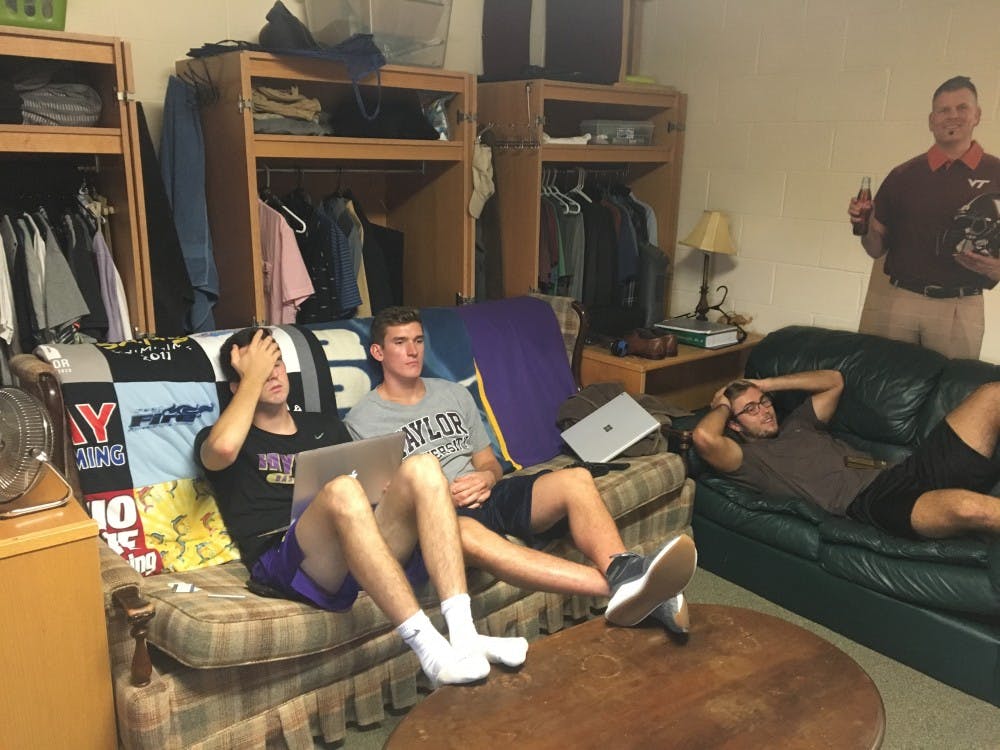By Drew Shriner | Echo

It's fall. Classes are getting in full swing, students are developing friendships and, coincidentally, professional football, basketball, soccer and hockey all begin their seasons.
Within dorms, more and more time is devoted to watching gifted athletes compete. Some students give their entire weekends to watching football (collegiate on Saturdays and professional on Sundays).
Perhaps we need to ask ourselves how this is affecting our community.
Watching sporting events with others, or communal fandom, can be a great way to begin relationships.
Third East Wengatz Personnel Assistant junior Dan Burson uses communal fandom as a way to get people in his room and get to know them.
"I watch sporting events multiple times a week with wingmates," Burson said. "My roommates and I usually have football games on all of Saturday and Sunday afternoon. Our door is open, so guys can come and go as they please."
However, it would be dangerous for students to believe that communal fandom is a type of end. Intentional friendships should go deeper than the shared interest of sports.
This is how Wengatz Hall Director Josh Craton sees it.
"Casual community - like watching sports - is a good stepping stone into relationships with more depth," Craton said. "I wouldn't want friendships to ONLY exist around watching sports together, but it gets people comfortable with each other and tills the soil well."
If students allow their fandom to dominate their relationships with others, true community ends up being stunted.
To use terminology from M. Scott Peck's four stages of community, communal fandom can keep people in "pseudocommunity," a stage where real conversations do not take place and meaningful relationships do not develop.
However, students do not only need to be wary of communal fandom as an end. They also should be wary of the way that their fandom impacts the living of their faith.
As an article published in "Christianity Today" entitled "How Christians Do March Madness" points out, Christians can often act rather un-Christian towards others.
The author of the article, Chad Carlson, singles out the Hope College versus Calvin College rivalry.
"Like most rivalries, certain behavior at Calvin-Hope games (and trash talk outside it) has done little to glorify God's kingdom or show love to our collegiate neighbors," Carlson wrote. "The Calvin student section shouts, 'There's No Hope!' Hope students have responded with 'Calvin Sucks' T-shirts and posters declaring 'Calvin (K)nights Are Boring.'"
The article goes on to highlight several on-court infractions as well, such as a punch and a player getting trampled by students rushing the court.
At the time of publication, Carlson was the head coach of Hope's junior varsity basketball team, and so had a vested interest in seeing the character of his school's rivalry improve.
Likewise, members of the Taylor community have a vested interest in seeing the character of our community improve, and a close evaluation of our communal fandom may be necessary.
Wing Super Bowl parties should not result in the fans of the losing side feeling demeaned on top of the sadness of losing the game. I apologize, Josiah Peterson and Hannes Widrig.
The Indiana Pacers losing to the Cleveland Cavaliers on a Lebron James buzzer-beater should not result in an intense anger. I apologize to everyone that tried to interact with me after that game.
Ultimately, communal fandom has a place on this campus, but that place must be firmly subservient to the call to live marked by love for God and love for others.





